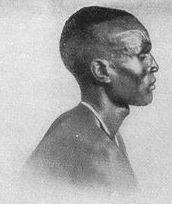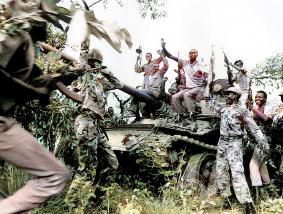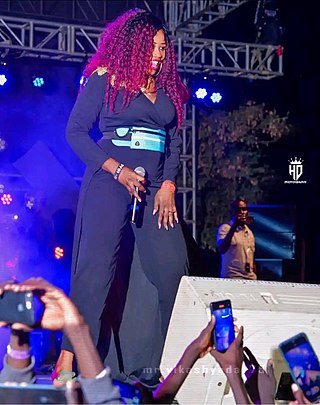Joan Hecht is an American humanitarian and award winning author of the book The Journey of the Lost Boys . She is also the founder and President of the 501 c-3 non-profit Alliance for the Lost Boys of Sudan, an organization that assists with the health and educational needs of Lost Boys and their families living in the United States and Africa. Hecht formerly traveled as a back-up singer for The Johnny Van Zant Band and began recording professionally at age 14. However, she is best known for her work related to the Lost Boys of Sudan, including engaging in public speaking on their behalf and that of the people of South Sudan, as well as writing an award winning book about them titled, "The Journey of the Lost Boys".
Hecht first encountered the Lost Boys in 2001, when 85 of the approximately 3800 refugees who had relocated to the United States settled in Jacksonville, Florida. Hecht became a mentor to the Lost Boys of Sudan and continues to assist the Lost Boys and the people of South Sudan on a volunteer basis, as they acclimate to life in the US and struggle to assist remaining family members and friends in South Sudan. [1] Prior to meeting the Lost Boys of Sudan, Hecht had worked as an executive in sales and marketing and also as a professional singer, backing Johnny Van Zant. [2] In 2002, after Ezekiel Kong Deng — one of the refugees whom she had unofficially adopted — died following a failed liver transplant, Hecht conceived the idea of creating a Foundation to assist the refugees.
In 2004, she founded the Alliance for the Lost Boys of Sudan. She serves as director for the organization, which provides aid for educational and medical needs to the refugees in the United States as well as in Africa, where it also provides basic survival needs and assists in funding the construction of clinics and schools, housing at orphanages and hospitals and the drilling of eight water wells that provide clean drinking water for thousands of rural villagers. . [3] [4] In 2005, she released the book The Journey of the Lost Boys, a narrative of the experiences of these refugees, which earned "First Place in Education" and garnered Hecht the title of "2005 Author of Year" by the Promoting Outstanding Writers organization of Mandarin. [1] [5] [6] She has also been since 2007 the volunteer chairwoman of education on the Board of Directors for The Lost Boys and Girls of Sudan National Network, based in Washington DC. [7]
In 2007, Bank of America named Hecht one of its "Local Heroes" for her humanitarian efforts, and early in 2008, the Sunshine State Teachers of English to Speakers of Other Languages of Florida awarded Hecht its President's Award for the same. [8] In October 2008, Florida Governor Charlie Crist named Hecht a "Point of Light" for her work with the refugees, commenting that "Over the past seven years, Joan has worked tirelessly on behalf of the Lost Boys of Sudan.... Her efforts to provide mentoring opportunities have helped Sudanese youth discover their dreams and potential." [7] Hecht also received The Points of Light Award from the National Points of Light Institute, which was founded by President George H. W. Bush. Hecht and her family, along with local Lost Boys were featured in Disney's November 2007 's Family Fun magazine, which in coordination with the Hands on Network, selected them as the 2007 grand prize winners of its "Family Fun Volunteers Contest." [6]

Darfur is a region of western Sudan. Dār is an Arabic word meaning "home [of]" – the region was named Dardaju while ruled by the Daju, who migrated from Meroë c. 350 AD, and it was renamed Dartunjur when the Tunjur ruled the area. Darfur was an independent sultanate for several hundred years until it was incorporated into Sudan by Anglo-Egyptian forces in 1916. As an administrative region, Darfur is divided into five federal states: Central Darfur, East Darfur, North Darfur, South Darfur and West Darfur. Because of the War in Darfur between Sudanese government forces and the indigenous population, the region has been in a state of humanitarian emergency and genocide since 2003. The factors include religious and ethnic rivalry, and the rivalry between farmers and herders.

The Dinka tribe are a Nilotic ethnic group native to South Sudan with a sizable diaspora population abroad. The Dinka mostly live along the Nile, from Jonglei to Renk, in the region of Bahr el Ghazal, Upper Nile, and the Abyei Area of the Ngok Dinka in South Sudan.

The Nuer people are a Nilotic ethnic group concentrated in the Greater Upper Nile region of South Sudan. They also live in the Ethiopian region of Gambella. The Nuer speak the Nuer language, which belongs to the Nilotic language family. They are the second largest ethnic group in South Sudan. The Nuer people are pastoralists who herd cattle for a living. Their cattle serve as companions and define their lifestyle. The Nuer call themselves "Naath".

The Second Sudanese Civil War was a conflict from 1983 to 2005 between the central Sudanese government and the Sudan People's Liberation Army. It was largely a continuation of the First Sudanese Civil War of 1955 to 1972. Although it originated in southern Sudan, the civil war spread to the Nuba mountains and the Blue Nile. It lasted for 22 years and is one of the longest civil wars on record. The war resulted in the independence of South Sudan six years after the war ended.

The Lost Boys of Sudan refers to a group of over 20,000 boys of the Nuer and Dinka ethnic groups who were displaced or orphaned during the Second Sudanese Civil War (1987–2005). Two million were killed and others were severely affected by the conflict. The term was used by healthcare workers in the refugee camps and may have been derived from the children's story of Peter Pan. The term also was used to refer to children who fled the post-independence violence in South Sudan in 2011–2013.

God Grew Tired of Us is a 2006 American documentary film about three of the "Lost Boys of Sudan", a group of some 25,000 young men who have fled the wars in Sudan since the 1980s, and their experiences as they move to the United States. The film was written and directed by Christopher Dillon Quinn.

Medair is an international non-governmental organisation (INGO) whose purpose is to relieve human suffering in some of the world's most remote and devastated places. Medair aims to assist people affected by natural disasters and conflict to recover with dignity through the delivery of quality humanitarian aid.
The Journey of the Lost Boys (2005) is a non-fiction book by Joan Hecht about The Lost Boys of Sudan. "The Lost Boys" are a group of young children who became separated from their parents due to civil war in their homeland. With little food and water and no protection from wild animals and enemy soldiers that stalked them night and day, these children banded together walking over a thousand miles across the wilds of Africa in search of safe refuge.
John Dau, also known as Dhieu-Deng Leek is a human rights activist from South Sudan. He is one of the Lost Boys of Sudan who was featured in the 2006 award-winning documentary God Grew Tired of Us. In 2007, he founded the John Dau Foundation aiming to transform the health system in South Sudan.

Mary Boyoi is a South Sudanese singer, Author and daughter to former SSPDF Commander.
The Alliance for the Lost Boys of Sudan is a 501 C-3 all-volunteer foundation in Jacksonville, Florida, established in 2004, to meet the health and educational needs of Lost Boys and their siblings living in Africa and the United States.
Sudan Sunrise, Inc. is a 501c3 organization based out of Fairfax, Virginia. According to their mission statement, Sudan Sunrise strives for grassroots reconciliation, education and community building in order to lift up examples of peace and forgiveness between former enemies as alternatives to the history of violence in Sudan and South Sudan. Sudan Sunrise also facilitates local efforts in Southern Sudan to provide education, health care and community development.
Community Hospice & Palliative Care, also known simply as Community Hospice, is a not-for-profit hospice, which has served the Greater Jacksonville Metropolitan Area since its inception in 1979. The organization was the first hospice program in Northeast Florida and one of a few operating programs in the state when Florida began granting hospice licenses in 1981; Community Hospice received their license in 1983 and in 2008, assisted nearly 1,000 patients daily and more than 6,000 patients a year.
Sister Luise Radlmeier, O.P., was a German religious sister who was led a movement to care for the victims of the military conflicts in central Africa.
Sudanese refugees are persons originating from the country of Sudan, but seeking refuge outside the borders of their native country. In recent history, Sudan has been the stage for prolonged conflicts and civil wars, as well as environmental changes, namely desertification. These forces have resulted not only in violence and famine but also the forced migration of large numbers of the Sudanese population, both inside and outside the country's borders. Given the expansive geographic territory of Sudan, and the regional and ethnic tensions and conflicts, much of the forced migration in Sudan has been internal. Yet, these populations are not immune to similar issues that typically accompany refugeedom, including economic hardship and providing themselves and their families with sustenance and basic needs. With the creation of a South Sudanese state, questions surrounding southern Sudanese IDPs may become questions of South Sudanese refugees.
By January 2011 the United Nations High Commissioner for Refugees (UNHCR) estimated that there are 262,900 Sudanese refugees in Chad. The majority of them left Sudan escaping from the violence of the ongoing Darfur crisis, which began in 2003. UNHCR has given the Sudanese refugees shelter in 12 different camps situated along the Chad–Sudan border. The most pressing issues UNHCR has to deal with in the refugee camps in Chad are related to insecurity in the camps,, malnutrition, access to water, HIV and AIDS, and education.

A Long Walk to Water is a short novel written by Linda Sue Park and published in 2010. It blends the true story of Salva Dut whose story is based in 1985, a part of the Dinka tribe and a Sudanese Lost Boy, and the fictional story of Nya whose story is based in 2008, a young village girl that was a part of the Nuer tribe. Park used this book as a platform to support Dut's organization, Water for South Sudan.
South Sudanese Americans are an ethnic group of Americans of South Sudanese ancestry, or South Sudanese people who have American citizenship. South Sudanese Americans can include American descendants to South Sudanese ancestors or South Sudanese immigrants who obtained an American citizenship.
Nyadol Nyuon, is an Australian lawyer and human rights advocate, who was born in a refugee camp in Ethiopia, of a family fleeing the Second Sudanese Civil War. She works as a commercial litigator in Melbourne and is a regular media commentator.
Akuch Kuol Anyieth is a South-Sudanese-Australian academic and writer.